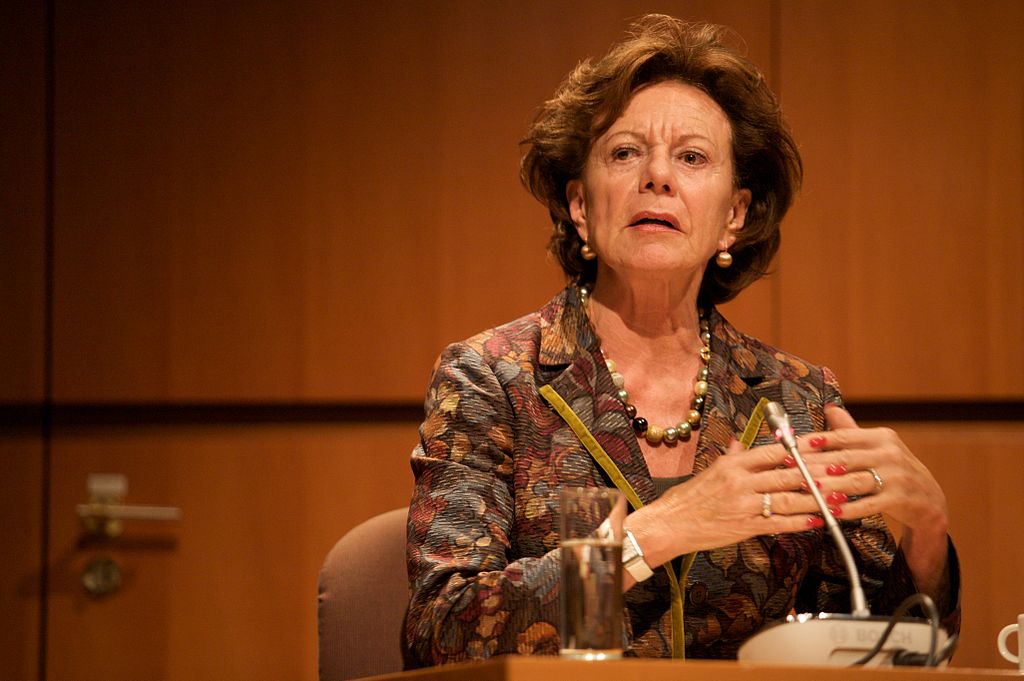Open internet voor hele EU

In een rede over de fundamenten van haar Digital Europe beleid zet Eurocommissaris Kroes uiteen waar haar nieuwste pakket voorstellen op neer zal komen. “While we – quite rightly – regulate chemicals, food, or toys, we have largely left the internet intact. And that’s precisely why it has been the source of so many new ideas. From cloud computing to crowd-sourced knowledge; video-on-demand to virtual universities.”
“Many Europeans aren’t getting the speeds or quality they paid for. This is a basic principle that applies in other consumer markets – it should apply to internet access too. In parallel we are seeing the pressure for national action on net neutrality. The telecoms single market is far from complete – and a failure to take coordinated action on net neutrality would shatter the fragile construction. If we don’t address net neutrality, wider problems will arise and tomorrow’s innovative services might have to stop at the border.”
In een eerder interrview met ScienceGuide schetste Commissaris Kroes reeds de contouren van haar beleid op dit terrein. Dat vraaggesprek leest u hier.
U leest haar volledige betoog met de voorstellen hieronder
‘Net neutrality can be a polarising debate. But I often find there is much we agree on. We agree that the internet is a great place to exercise and enjoy liberty. A great place to innovate, and implement new ideas without having to ask permission. And an open forum for all kinds of activity.
That’s why people find the internet such an incredible place to explore, experiment, experience. That’s why there’s so many great online services for all to enjoy. That’s why people are prepared to pay for high-quality connections: and are disappointed if they don’t deliver.
And if the net neutrality debate shows anything, it is how important the internet has become. Not just basic broadband, but high quality connections that are open, fast, enabling. Connectivity is at the heart of our innovative future. And people care about it deeply.
Openness and liberty are values I am determined to defend everywhere. I’m just back from a trip to Egypt. The Arab Spring showed us the power of the internet. So I am determined to support and champion that network. A network that is open and unified, and delivering democratic values. Across the world, and here in Europe.
That is why we have our No Disconnect strategy, helping global activists use ICT tools in their fight for freedom. And that is why I am determined to safeguard media freedom and pluralism, including in the digital age.
And yet, this is not a simple debate. Even though we agree on values, the debate is no less complex. Take the public highway: another open network. You can get on wherever you want, explore and drive anywhere. Yet, our roads aren’t a lawless anarchy: they have traffic lights, speed limits, a Highway Code. Nor, on the other hand, do we overregulate; governments don’t tell you what kind of car to buy, or where to drive to. And, however open it is, the road network doesn’t come free of charge; someone has to pay, whether through taxes or tolls.
My point isn’t that the internet is like the road system: it isn’t, they are different networks. My point is that, for any open network, finding the right balance is not obvious. When to step in and set out rules; or when to hold back and let people make their own choices. The approach needs to follow not from ideology, but from an understanding of how that particular network actually operates. Then we can find the right way forward to preserve its benefits, project them into the future, and best protect users’ interests.
Finding that balance is not simple. Some like to imply that it is: but I’ve never believed in policy by slogan. Safeguarding the open internet in practice is too important a goal to trivialise, or reduce to mere mottos.
Let me give a few examples. The fact is, the online data explosion means networks are getting congested. Internet Service Providers (ISPs) need to invest in network capacity to meet rising demand: and the right predictable regulatory framework will help them do so. But, at peak times, traffic management will continue to play a role: and indeed it can be for legitimate and objective reasons; like separating time-critical traffic from the less urgent.
Many ISPs already do manage traffic in that way, avoiding congestion and ensuring quality. Likewise, many ISPs protect their customers from spam – something which has made a real positive difference, which I’d say most users find helpful, and are happy with.
Plus, different users have different network needs. Some people want a straightforward mobile package to check the odd email or website. Others want to constantly watch videos on their tablet, consuming high bandwidth. Those different needs are all valid; they are a reflection of the richness and diversity of the internet itself. I want to put those consumer needs right at the centre of our thinking. Operators need to respect these different needs, and to do that they must also be allowed to innovate to meet those needs.
Regulation matters. But while we – quite rightly – regulate chemicals, food, or toys, we have largely left the internet intact. And that’s precisely why it has been the source of so many new ideas. From cloud computing to crowd-sourced knowledge; video-on-demand to virtual universities. Ideas no central planner could ever have foreseen or provided for in advance. Ideas which had space to grow, precisely because no regulator tried to pick winners, or to second-guess innovation. That is a philosophy that should inspire. It is a success we should build on.
And yet it’s clear to me there are problems in today’s internet. The 2011 study by European regulators (through BEREC) showed that, for many Europeans, online services are blocked or degraded – often without their knowledge. For around one in five fixed lines, and over one in three mobile users. It is obvious that this impacts consumers, but start-ups also suffer. Because they lack certainty about whether their new bright ideas will get a fair chance to compete in the market.
Plus, many other Europeans aren’t getting the speeds or quality they paid for. This is a basic principle that applies in other consumer markets – it should apply to internet access too.
In parallel we are seeing the pressure for national action on net neutrality. The telecoms single market is far from complete – and a failure to take coordinated action on net neutrality would shatter the fragile construction. If we don’t address net neutrality, wider problems will arise and tomorrow’s innovative services might have to stop at the border.
I don’t want to see that happen. And I will soon be putting forward proposals to ensure it doesn’t – and I know you are keen to learn the details.
For me, an open platform is built on competition, innovation transparency, and choice. And that is what our proposal will be built on too.
First, we should allow innovation. The new services round the corner depend not just on content, but on high-quality connections. For example, if you’ve just bought a videoconferencing system, you’ll probably also want an internet service that guarantees the right quality, end-to-end. If someone wants to pay extra for that, no EU rules should stand in their way; it’s not my job to ban people from buying those services, nor to prevent people providing them. If you don’t want to buy them that is also fine, and you should absolutely continue to benefit from the “best efforts internet”.
Second, we must ensure transparency. Before you sign up to an internet contract, you want to know key details. What’s included, what’s not; and, in particular, what speed you’ll actually get. Too often those are hidden away in long and complex contracts. That’s not good enough. We all deserve a clear promise before signing up – not a nasty surprise after. After all, when you buy a carton of milk, you don’t expect it to be half-empty: the same goes for 50 Megabit internet.
Third, people need choice in their internet services. A real choice, not a theoretical one. If they want to switch providers, they should be able to do so, without countless obstructions. And, in practice, there are many barriers to switching: like excessive charges, modem hire, or email addresses. We will be looking at those barriers, and removing them. In particular, there needs to be an end to annoying practices – like quietly extending a contract for another year without asking. It’s time to put people back in the driving seat.
And fourth, innovation also needs competition. Services like Voice over Internet Protocol (VoIP) or messaging services – like Skype or WhatsApp – offer real innovation for consumers. But some ISPs deliberately degrade those services, or block them outright, simply to avoid the competition.
In my view, such ideas are on their way out. Most consumers see the richness and vibrancy of the full, unlimited internet and wouldn’t want anything less. So to be honest, with genuine transparency, I doubt many consumers would care to buy such a limited product; I doubt many ISPs would offer one.
But equally it’s clear to me that many Europeans expect protection against such commercial tactics. And that is exactly the EU safeguard we will be providing. A safeguard for every European, on every device, on every network: a guarantee of access to the full and open internet, without any blocking or throttling of competing services.
Those are the proposals I will be putting forward to the College of Commissioners. This is about delivering the best deal for citizens, full stop. Ensuring they get the fairest deals, the most choice, the best new services over the fastest networks. So my proposals will do that: with new rights for every citizen – and new obligations for every internet provider. To protect consumers – without tying down their freedom of choice. To maintain the incentives to upgrade to better infrastructure. To safeguard the open internet for every European – and keep it for a platform for rich and vibrant content – as a network at the heart of our economy, our society, and our connected continent.’
Meest Gelezen
Vrouwen houden universiteit draaiende, maar krijgen daarvoor geen waardering
Hbo-docent wil wel rolmodel zijn, maar niet eigen moreel kompas opdringen
Wederom intimidatie van journalisten door universiteit, nu in Delft
‘Waarom het nu niet lukt om medezeggenschap in hbo te versterken’
‘Sluijsmans et al. slaan de plank volledig mis’



